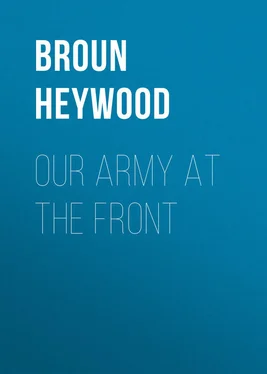Heywood Broun - Our Army at the Front
Здесь есть возможность читать онлайн «Heywood Broun - Our Army at the Front» — ознакомительный отрывок электронной книги совершенно бесплатно, а после прочтения отрывка купить полную версию. В некоторых случаях можно слушать аудио, скачать через торрент в формате fb2 и присутствует краткое содержание. Жанр: foreign_prose, foreign_antique, foreign_language, на английском языке. Описание произведения, (предисловие) а так же отзывы посетителей доступны на портале библиотеки ЛибКат.
- Название:Our Army at the Front
- Автор:
- Жанр:
- Год:неизвестен
- ISBN:нет данных
- Рейтинг книги:5 / 5. Голосов: 1
-
Избранное:Добавить в избранное
- Отзывы:
-
Ваша оценка:
- 100
- 1
- 2
- 3
- 4
- 5
Our Army at the Front: краткое содержание, описание и аннотация
Предлагаем к чтению аннотацию, описание, краткое содержание или предисловие (зависит от того, что написал сам автор книги «Our Army at the Front»). Если вы не нашли необходимую информацию о книге — напишите в комментариях, мы постараемся отыскать её.
Our Army at the Front — читать онлайн ознакомительный отрывок
Ниже представлен текст книги, разбитый по страницам. Система сохранения места последней прочитанной страницы, позволяет с удобством читать онлайн бесплатно книгу «Our Army at the Front», без необходимости каждый раз заново искать на чём Вы остановились. Поставьте закладку, и сможете в любой момент перейти на страницу, на которой закончили чтение.
Интервал:
Закладка:
Three-fourths of their playing they did with the French children. The insurmountable French language, which kept doughboys and poilus at arm's length in spite of their best intentions, broke down with the youngsters.
It was one of the finest sights around the camp to see the big soldiers collecting around the mess-tent after supper, in the daylight-saving long twilight, to hear the band and play in pantomime with the hundreds of children who tagged constantly after them.
The band concerts were a regular evening affair, though musically they didn't come to much. Those were the days before anybody had thought to supply the army bands with new music, so "She's My Daisy" and "The Washington Post" made a daily appearance.
But the concerts did not want for attendance. The soldiers stood around by the hundreds, and listened and looked off over the hills to where the guns were rumbling, whenever the children were not exacting too much attention.
This child-soldier combination had just two words. The child said "Hello," which was all his English, and the party lasted till the soldier, billet-bound, said "Fee-neesh," which was all his French. But nobody could deny that both of them had a good time.
Letter-writing was another favorite sport with the First Division, to the great dole of the censors. Of course the men were homesick. That was one reason. The other was that they had left home as heroes, and they didn't intend to let the glory lapse merely because they had come across to France and been slapped into school. The censors were astounded by what they read … gory battles of the day before, terrific air-raids, bombardments of camp, etc. Some of the men told how they had slaughtered Germans with their bare hands. Most of the letters were adjudged harmless, and of little aid or comfort to the enemy, so they were passed through. But some of the families of the First Division must have thought that the War Department was holding out an awful lot on the American public.
Mid-July saw the camp in fair working order. The First Division had word that it was presently to be joined by the New England Division and the Rainbow Division, both National Guardsmen, and representative of every State.
American participation began to take shape as a real factor, a stern and sombre business, and all the lighter, easier sides of the expedition began to fall back, and work and grimness came on together.
The French Alpine Chasseurs – whom the Americans promptly called "chasers" – had a party with the Americans on July 14, when the whole day was given over to a picnic, with boxing, wrestling, track sports, and a lot of food. That was the last party in the training-camp till Christmas.
The work that began then had no let-up till the first three battalions went into the trenches late in October. The steadily increasing number of men widened the area of the training-camp, but they made no difference in the contents of the working-day, nor in the system by which it proceeded.
Within the three weeks after the First Division had landed, the work of army-building began.
CHAPTER VI
GETTING THEIR STRIDE
THAT part of France which became America in July, 1917, was of about the shape of a long-handled tennis-racket. The broad oval was lying just behind the fighting-lines. The handle reached back to the sea. Then, to the ruin of the simile, the artillery-schools, the aviation-fields, and the base hospitals made excrescences on the handle, so that an apter symbol would be a large and unshapely string of beads.
But France lends itself to pretty exact plotting out. There are no lakes or mountains to dodge, nor particularly big cities to edge over to. In the main, the organizing staffs of the two nations could draw lines from the coast to the battle-fields, and say: "Between these two shall America have her habitation and her name."
The infantry trained in the Vosges. The artillery-ranges were next behind, and then the aviation-grounds. The hospitals were placed everywhere along the lines, from field-bases to those far in the rear. And because neither French train service nor Franco-American motor service could bear the giant burden of man-and-supply transportation, the first job to which the engineer and labor units were assigned was laying road-beds across France for a four-track railroad within the American lines.
In those days America did not look forward to the emergency which was to brigade her troops with French or British, under Allied Generalissimo Foch. Her plans were to put in a force which should be, as the English say of their flats, "self-contained." If this arrangement had a fault, it was that it was too leisurely. It was certainly not lacking on the side of magnificence, either in concept or carrying-out.
The scheme of bringing not only army but base of supplies, both proportionate to a nation of a hundred million people, was necessarily begun from the ground up. The American Army built railroads and warehouses as a matter of course. It laid out training-camps for the various arms of the service on an unheard-of scale. As it happens, the original American plan was changed by the force of circumstances. Much of the American man-power eventually was brigaded with the British and French and went through the British and French soldier-making mills. But the territory marked America still remains America and the excellent showing made by the War Department in shipping men during the spring and early summer of 1918 furnished a supply of soldiers sufficient to make allotments to the Allies directly and at the same time preserve a considerable force as a distinctly American Army. It is possible that the fastest method of preparation possible might have been to brigade with the Allies from the beginning. But it would have been difficult to induce America to accept such a plan if it had not been for the emergency created by the great German drive of the spring of 1918.
American engineers were both building railroads and running them from July on. The hospital units were installed even earlier. The first work of an army comes behind the lines and a large proportion of the early arrivals of the A. E. F. were non-fighting units. At that there was no satisfying the early demands for labor. As late as mid-August General Pershing was still doing the military equivalent of tearing his hair for more labor units and stevedores. A small number of negroes employed as civilian stevedores came with the First Division, but they could not begin to fill the needs. Later all the stevedores sent were regularly enlisted members of the army. While the great undertaking was still on paper and the tips of tongues, the infantry was beginning its hard lessons in the Vosges. The First Division was made up of something less than 50 per cent of experienced soldiers, although it was a regular army division. The leaven of learning was too scant. The rookies were all potentiality. The training was done with French soldiers and for the first little while under French officers. A division of Chasseurs Alpines was withdrawn from the line to act as instructors for the Americans, and for two months the armies worked side by side. "You will have the honor," so the French order read, "of spending your permission in training the American troops." This might not seem like the pleasantest of all possible vacations for men from the line, but the chasseurs seemed to take to it readily enough. These Chasseurs Alpines – the Blue Devils – were the finest troops the French had. And if they were to give their American guests some sound instruction later on, they were to give them the surprise of their lives first.
The French officer is the most dazzling sight alive, but the French soldier is not. Five feet of height is regarded as an abundance. He got his name of "poilu" not so much from his beard as from his perpetual little black mustache.
Читать дальшеИнтервал:
Закладка:
Похожие книги на «Our Army at the Front»
Представляем Вашему вниманию похожие книги на «Our Army at the Front» списком для выбора. Мы отобрали схожую по названию и смыслу литературу в надежде предоставить читателям больше вариантов отыскать новые, интересные, ещё непрочитанные произведения.
Обсуждение, отзывы о книге «Our Army at the Front» и просто собственные мнения читателей. Оставьте ваши комментарии, напишите, что Вы думаете о произведении, его смысле или главных героях. Укажите что конкретно понравилось, а что нет, и почему Вы так считаете.












